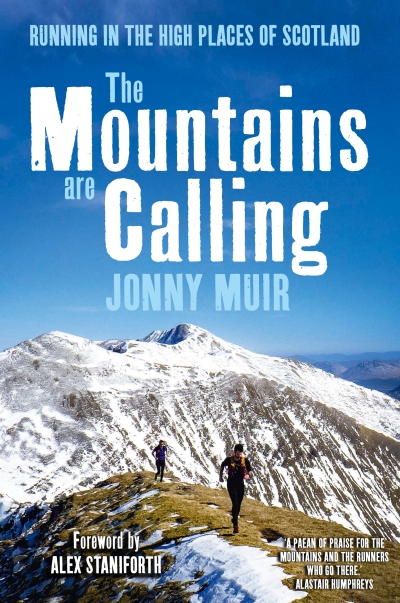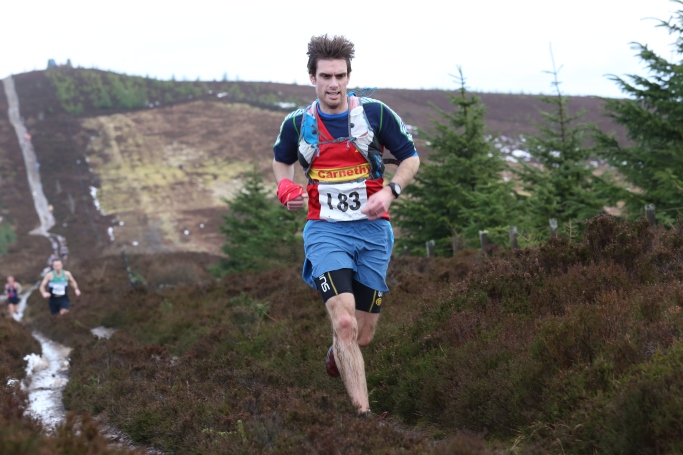This is a first for me and my little blog, I am very excited to introduce author and fellow fell-runner, Jonny Muir. Jonny will be guest posting on RussellRunner today, which means he will be doing all the hard work while I sit back with a pack of Ginger Nuts and watch a pro at work.
As part of his Blog Tour, which marks the release of his new book The Mountains are Calling: Running in the High Places of Scotland Jonny will be including an extract from his new book.
While The Mountains are Calling is the story of hill running in Scotland, tracing its origins back to the 11th century Highlands, it also follows Jonny’s personal journey in training for and completing Ramsay’s Round, a 60-mile loop of 23 Munros that has only been accomplished 109 times in 40 years.
As he prepared to undertake the round, Jonny’s greatest challenge was the need to juggle his family and work life with a need to go to the hills. His two daughters were then aged four and two, the same age as my kids now, and he was simultaneously working full-time as an English teacher in Edinburgh. In this extract, Jonny talks about trying to maintain the delicate balance between family, work and running.
So without further ado…

The essence of Nick Hornby’s biographical Fever Pitch is that Arsenal Football Club is the author’s constant in life. Amid the flux of education, work and relationships, happiness, sadness and indifference, Arsenal and football remain resilient to the vagaries of Hornby’s being. Come what may, for Hornby, it is Arsenal yesterday, Arsenal today and Arsenal tomorrow. The affection is timeless and unconditional.
Running is my thread, my Arsenal. The sport links a scrawny, unknowing twelve-year-old boy on a cross-country course in Worcestershire to a husband and father on the run I will do tomorrow. Naturally, the business of life intervenes. Running has at times been pivotal; at other moments peripheral. But the thread – at times twisted and stretched, tense and ravelled – endures.
The snarliest knot in that thread coincided with children. Six weeks of two-hourly Thursday night sessions – with twitchy-eyed Christine from the National Childbirth Trust explaining mucus caps and episiotomy – had not prepared Fi and me for the birth of Arielle. During the first session, the couples were handed images of new-born babies, some still decorated in the blood of childbirth.
‘What are you thinking?’ Christine gently asked.
‘I’m thinking . . .’ Fi paused, framing a statement as a question. ‘It looks disgusting?’
Our baby was not ‘disgusting’, but the rhythm of our individual and mutual lives, something we had moulded over many years, was destroyed in an early morning in a maternity ward overlooking Westminster Bridge. Our first week as parents was spent in a near-delirious trance. Looking back, we were undoubtedly in a state of shock. We were not sleeping, of course, and a cold that had lingered in the fortnight before Arielle’s birth overwhelmed me, becoming glandular fever. Something had to give. I stopped running.
Even at three months, Arielle preferred nocturnal living. One night – a night that was probably no worse than many others – was, on reflection, a psychological turning point. I wrote in a diary: ‘I struggle for one all-defining adjective as every day the reality of being a parent is shaped differently. Compromise is the great battle. Where do my priorities lie? With my baby? She comes first, not some inconsequential trip to the track or a ten-mile run. But in giving Arielle life, has something in us died? No parent should feel guilty about maintaining a sense of independence, should they? Yet I feel ashamed for even intimating that my personal pursuits might – for some minutes or hours of a day – be more important than the upbringing of my daughter.’
Tentatively, I started running again. The knot loosened.
It is not always like this. Sam Hesling would be the runner-up in the Carnethy 5 hill race in the Pentlands a fortnight after becoming a father for the first time. Having had the ‘race of his life’, moving from fifth to first in the descent of the final hill, he was beaten by a second in a sprint finish.
‘How are you finding it?’ I had asked Sam, grimacing, offering the sympathetic face of a man who knows.
He seemed surprised by the question. ‘Good,’ he nodded. Better than ‘good’; he was inspired. ‘It’s made me more determined – determined for her to see me race at the highest level I can. I want her to remember her dad doing well. I don’t want her to think her dad is a big idiot!’
The words I had written years earlier jolted me again. Sam and I, we would run on.

Jonny Muir is a runner, writer and teacher, and The Mountains are Calling, published by Sandstone Press, is his fourth book. A runner since his school days, Jonny ran and raced on road, track and trail before receiving a calling to the mountains. Since then, he has run extensively in the British hills and mountains, and has completed the Bob Graham Round and Ramsay’s Round.
The Mountains are Calling is available from:
You can contact Jonny through the social media avenues below!
